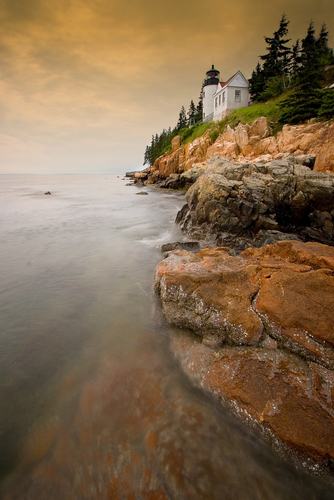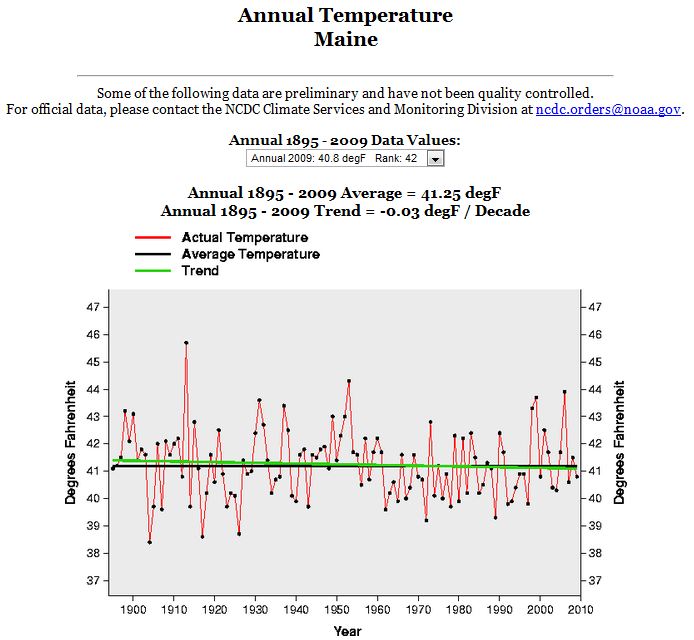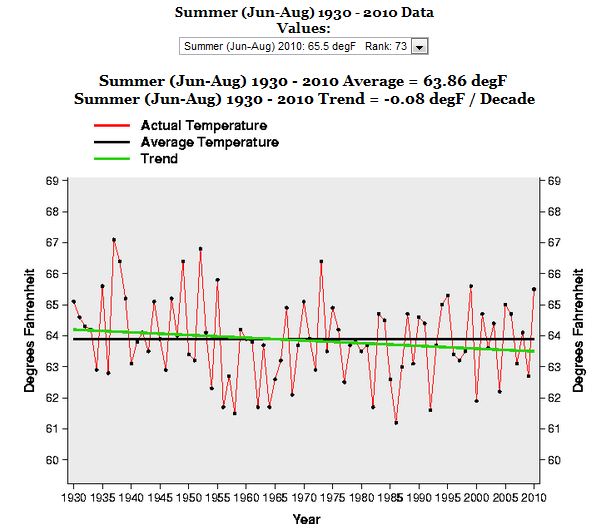Human-caused climate disruption could make Maine’s Acadia National Park as hot this century as Atlantic City, New Jersey, has been, according to a new report from RMCO and the Natural Resources Defense Council (NRDC). If future emissions of heat-trapping pollutants continue at a medium-high level, the average of the projections from 16 climate models is that Acadia would get 8.5°F hotter by 2070-2099 than it was in 1961-1990.
http://www.rockymountainclimate.org/programs_12.htm
Let’s see how the 16 climate models are doing so far :
http://www.ncdc.noaa.gov/oa/climate/research/cag3/me.html
Maine has shown no temperature trend for the entire NCDC record, even including their recent upwards adjustments. Summer temperatures have declined significantly over the last 80 years.
Climate model witchcraft is not science.





That can’t be true. CO2 controls climate. Man has been producing excesses of CO2 for more than 100 years. The earth is warming. You are looking at a small part of the world and saying the whole world is like it. Global warming is happening. It’s a fact. The only thing we can do at this point is mitigate the damages our grandchildren we feel from global warming.
Ok, enough of the sarcasm. Back to the real world:
The fact that nothing out of the ordinary is happening in climate is proof that the manmade global warming hypothesis is wrong. If a hypothesis doesn’t have supporting evidence it must be discarded. CO2 does not control climate. Man is not changing climate. If anyone claims man does they must produce the evidence tying man to that climate change. Don’t be like cultures of the past that believed eclipses happened because the actions of man. We think they are gullible for thinking that. Do you ever wonder what people think of those believe CO2 controls climate?
AAM:
You really believe that eclipses are NOT caused by Man. Next you will probably try to convince us that Earth orbits the sun rather than what we ALL know, that the sun orbits the Earth.
The solar eclipse is when the moon comes between the Earth and the sun. There fore a lunar eclipse is when the sun comes between the Earth and the moon
Ok, got ya…..I think.
Sorry for my maroonish head.
😉
Just wait until we get CO2 back to 290 ppm, then watch out…
OMG ! CO2 doesn’t control climate ? ! ? And . . THE SUN DOESN’T ORBIT THE EARTH ? ! ?
It’s MUCH worse than we thought . . . ! ! ! We’re all gonna die ! !
. . . sorry, just couldn’t resist . . . 🙂
( . .hey, that last one is true – someday, we all will . . . )
The NCDC divisional data, used here and in other posts to show “state” averages, has problems that tend to make it unsuitable for describing trends. For one thing, the “state” averages are constructed from whatever stations happen to be available at a given time, and as that subset changes over the years, the average can shift for that reason alone. In the state of Maine, a negative bias has been demonstrated for NCDC data on two of the three climate regions.
The cited report specifically mentions Acadia National Park, however, not the state of Maine. Acadia is the site of a longterm USHCN station, which does in fact show warming.
The Acadia annual temperature rose about .07C/decade over 1895-2009, and .10C/decade since 1975. Winter warming has been more noticeable, about .39C/decade since 1995.
The researchers are not, of course, simply extrapolating these linear historical trends. But those trends clearly show warming, with the timing pattern of global change.
Makes sense. The trends are going to speed up 10X some time really soon, because the effect of CO2 tails off logarithmically with further increases. And no doubt the climate models are fined tuned for one weather station while the rest of the state cools.
Thanks for the insight.
Yea, some warming trend. Just as warm as 60 years ago.
http://cdiac.ornl.gov/cgi-bin/broker?id=170100&_PROGRAM=prog.gplot_meanclim_mon_yr2009.sas&_SERVICE=default¶m=TMEANRAW&minyear=1950&maxyear=2009
Gneiss says:
November 11, 2010 at 4:07 am
The NCDC divisional data, used here and in other posts to show “state” averages, has problems that tend to make it unsuitable for describing trends.
Can’t trust the trends? Then can’t trust the temps either.
The warmest decade ever is not the warmest decade ever now. Good to know.
Gneiss says:
November 11, 2010 at 4:07 am
Acadia annual temperature rose about .07C/decade over 1895-2009, and .10C/decade since 1975. Winter warming has been more noticeable, about .39C/decade since 1995……But those trends clearly show warming, with the timing pattern of global change.
I thought we couldn’t trust localized weather, but now you indicate we can.
So from now on we should all follow your lead and trust localized weather.
You’re bating .1000 today Gneiss.
1.000
Gneiss says:
November 11, 2010 at 4:07 am
Acadia annual temperature rose about .07C/decade over 1895-2009, and .10C/decade since 1975.
You cherry picked time frames to try to prove your global warming.
Congratulations you have just eliminated another hockey stick!
speaking of Hockey Sticks, did you see this one?
http://www.youtube.com/watch?v=9-B77WMFpxk
0.07 degress over a 114 year period. A clear refutiation of skeptics.
Taking a simplified dictionary definition of “to pollute”, we find it means
Leave it to activists or NGOs like the NRDC to stretch the definition to also include “heat-trapping pollutants”. Going after toxic chemicals or other man-made substances such as CFCs is one thing — but CO2 ? A naturally occurring element, vital to the health of plant-life ?
So, if we follow the activists desires, what’ll happen? We’ll dive headfirst into poverty; unable to pay our main creditor, China will be able to buy us out and turn us into their manufacturing colony (learn to speak Mandarin). They’ll be able to clean up their own environment and send us the dirty jobs (and its attendant pollution). And after our own environment has been sacrificed, the first groups to be sacrificed will be all those greenie weenies.
“…..And after our own environment has been sacrificed, the first groups to be sacrificed will be all those greenie weenies.”
If it gets to that point, the “greenie weenies” would have already been sacrificed….. on the alter of retribution. Bet on it.
stevengoddard writes,
“And no doubt the climate models are fined tuned for one weather station while the rest of the state cools.”
You missed that part too. The rest of the state is not cooling, you’re just using bad data.
“Thanks for the insight.”
Happy to help out.
NCDC data is bad? Can I quote you on that?
Who cares about an order of magnitude error anyway?
Amino writes,
“You cherry picked time frames to try to prove your global warming.”
I’m not trying to prove global warming, and I certainly couldn’t do that with data from one station on the coast of Maine.
I picked 1895 to present because that’s all the data we’ve got in the USHCN record.
I then mentioned 1975 to present because that’s the takeoff period for modern warming.
When I wrote that Acadia “shares the timing pattern of modern global change,” here’s what I meant:
Gradual warming through early 20th century.
Slight cooling in mid-century.
Warming after about 1975.
That timing pattern is a signature that shows up in many different records of 20th-century global change.
stevengoddard writes,
“NCDC data is bad? Can I quote you on that?”
The NCDC regional data are not well suited for describing trends, although that’s how you keep trying to use them. USHCN are better. Not my insight, it’s been published, including the part about Maine.
A Real Scientist would know that.
Real Scientists know it is all garbage that has been sent through the disposer, ready to be sent down the drain where it belongs. At this time the books have been overcooked.
You should call up NOAA and NCDC and tell them to take down their trend maps, because they are “not well suited for describing trends.”
Let us know how that conversation goes.
The Green Gang of peculating AGW alarmists navigates by IFR: Not the Instrument Flight Rules known to pilots in low-to-zero visibility conditions, but the Invisible Flying Rabbits that govern whatever their benighted “climate studies” (sic) finds difficult to comprehend.
As for Maine, Moosehead Lake in winter 2009 recorded a Fahrenheit temperature below that of late spring at the South Pole. Now at the threshold of a 70-year “dead sun” Maunder Minimum if not an end of Earth’s current Holocene Interglacial Epoch, anyone granting Warmists the slightest credibility has only themselves to blame.
Gneiss is right. Local cooling is local, local warming is global. And global cooling is local.
Gneiss is right of course.
You can’t trust any temperature data that does not show warming in line with the models.
At least not until after it has been adjusted and homogenized.
omno writes,
“Gneiss is right. Local cooling is local, local warming is global. And global cooling is local.”
Paul H writes,
“Gneiss is right of course.
You can’t trust any temperature data that does not show warming in line with the models.”
You’re both writing nonsense, which I guess is what you believe that other people believe, but they don’t, it’s just you.
The article discusses future temperatures in Acadia. “Steve” countered that with badly averaged past temperatures for the whole state of Maine. I pointed out that the best information about past temperatures in Acadia is past temperatures in Acadia.
Past temperatures in Acadia happen to show a timing pattern similar to that of past global temperatures.
You are arguing about 3% error in a prediction which is off by 90%. Brilliant.
stevengoddard writes,
“You are arguing about 3% error in a prediction which is off by 90%.”
False. I did not argue about a prediction. I pointed out that you were trying to use data you did not understand, to criticize a report you had not read.
“Brilliant.”
Amazing.
So you don’t trust climate data from the National Climate Data Center. Alrighty then.